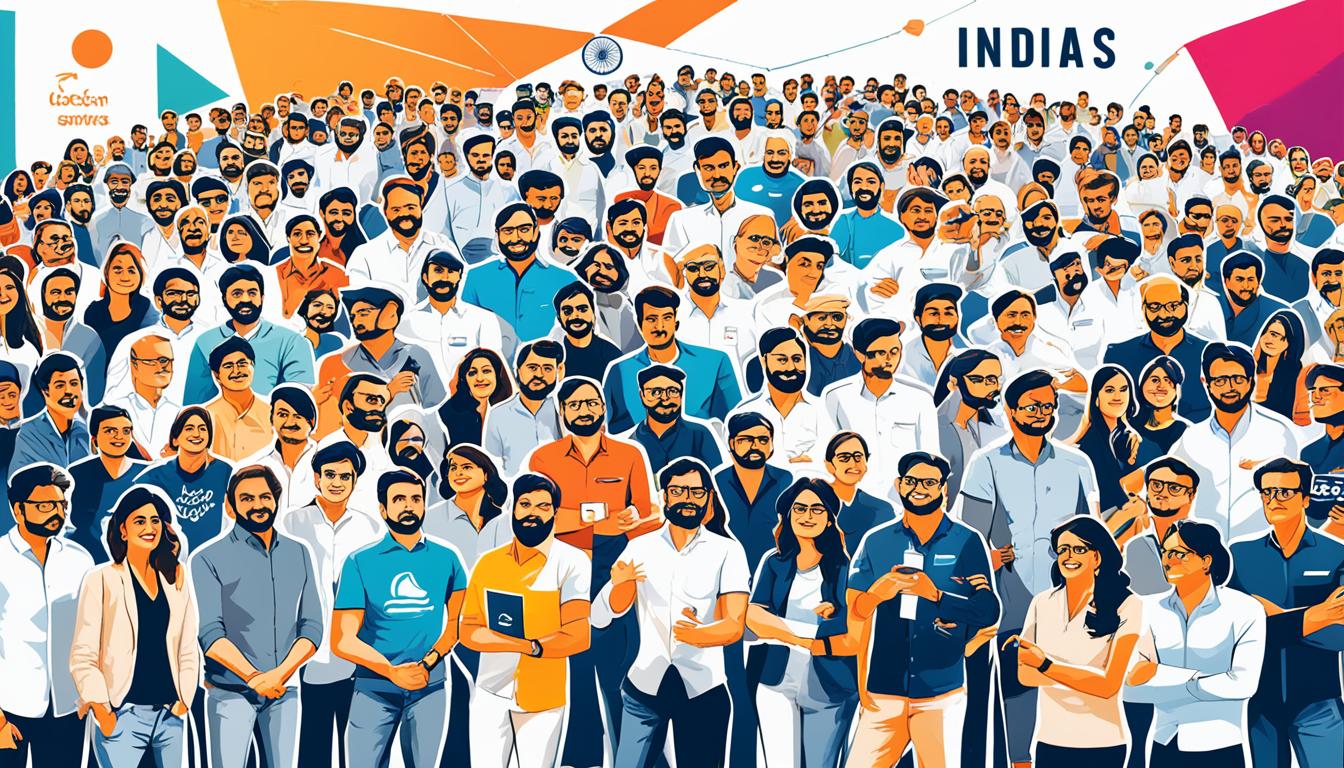Hyderabad , India
Looking back, the dream of starting a business seemed far away for many. Just six years ago, only 452 startups existed. Now, we have an amazing 84,012 startups as of November 2022. This growth shows the power of ambition, talent, and dreams coming true.
Incubators and accelerators play a big role in this growth. They help turn innovative ideas into successful businesses. With over 900 startup accelerator programs expected by the end of 2023, these groups are more than just helpers. They are key to innovation and funding opportunities.
They offer support to startups, making connections that lead to success. Let’s explore their roles, differences, and why they’re crucial for entrepreneurs in India.
Key Takeaways
- India boasts over 84,000 startups, showcasing exponential growth in entrepreneurship.
- Support systems like incubators and accelerators are vital for success.
- These entities provide resources and opportunities for connecting with investors.
- The emergence of mentorship networks enhances startups’ growth potential.
- Innovative firms are being cultivated, leading to transformative economic impacts.
Introduction to India’s Startup Boom
The India startup boom has changed the innovation landscape. It has made India a key player in the world of startups. Now, India is the third fastest-growing tech startup hub, with over 4,200 startups creating more than 80,000 jobs.
This growth has made entrepreneurship in India exciting. It draws investors and those who dream of starting their own businesses.
By May 31, 2023, India had 108 unicorns, with a total value of $340.80 billion. In 2021, India added 44 unicorns, more than in the whole previous decade. Bengaluru is now the top spot for startups, and Delhi-NCR is second in funding.
The government has helped this entrepreneurship growth a lot. The Start-up India project has created formal support in 31 states and union territories. It encourages innovation. The FFS and SISFS also help startups get funding at different stages.
With over 84,000 recognized startups and nearly 9,000 investors in seed rounds, the future looks bright. Sectors like e-commerce and SaaS companies are booming. They show how strong this startup scene is.
The Definition and Purpose of Incubators and Accelerators
For entrepreneurs in India, knowing what incubators and accelerators are is key. These programs help early-stage startups grow. Incubators focus on helping new ideas grow by offering mentorship, infrastructure, and guidance. They work with startups for one to five years to improve their business models.
Accelerators, on the other hand, are all about fast growth. They take startups with a product ready for the market and help them grow quickly. These programs last from two to six months and offer a structured way to learn and grow. They end with a demo day to help startups get funding from investors.
Incubators help new ideas grow and develop. Accelerators focus on making startups ready for the market quickly. Both are important in the startup world, offering different benefits at different stages. Knowing the difference helps founders pick the right support for their business goals.
| Aspect | Incubators | Accelerators |
|---|---|---|
| Duration | 1 to 5 years | 2 to 6 months |
| Support Type | Mentoring, legal help, shared workspaces | Intensive education, cohort-based learning |
| Target Stage | Early-stage startups | Startups with MVP |
| Funding | Variable, often mentorship-focused | Equity stake for funding |
| Application Process | Less rigorous criteria | High selectivity |
Incubators and Accelerators: Key Differences
It’s important for entrepreneurs to know the differences between incubators and accelerators. They have different goals, funding, and support lengths. Incubators are often non-profits supported by governments or schools. They help early-stage startups develop their business models without giving out money right away.
Accelerators, however, are for-profit and work with big companies. They focus on fast growth. They offer programs that include funding in exchange for a share of the company. This money is key for startups wanting to grow big fast.
Incubators support startups for a long time without focusing on raising money first. Accelerators, though, offer short programs of three to six months. They focus on quick growth and getting money.
Here’s a detailed comparison to illustrate the key differences between incubators and accelerators:
| Aspect | Incubators | Accelerators |
|---|---|---|
| Funding | Typically do not provide funding | Provide funding in exchange for equity |
| Duration | Long-term engagement | Short-term, usually 3-6 months |
| Focus | Business model development | Rapid growth and investor access |
| Equity Take | Little or no equity taken | Some equity taken |
| Selection Criteria | Open to a wider range of startups | Rigorous selection process, often for startups with MVP |
Choosing the right support system is crucial for entrepreneurs. They should think about what they need. This will help them decide if an incubator or accelerator is best for their growth.
The Growth of Incubators and Accelerators in India
In recent years, India has seen a big jump in the number of incubators and accelerators. This shows how strong our startup scene is getting. From about 585 incubators in 2017, we expect to hit around 900 by 2023. This growth shows how important it is to have support systems for startups.
Now, over 400 incubators are up and running, with many still starting out. This helps the growth of accelerators, which give startups the resources they need.

States are working hard to improve their startup support at the local level. With efforts like Startup India, we’re not just helping the incubators we have. We’re also setting up new ones. This shows our big push for innovation.
| Incubator/Accelerator Name | Location | Year Established | Total Investments |
|---|---|---|---|
| Venture Catalysts | Mumbai | 2016 | 206 |
| Axilor Ventures | Bangalore | 2014 | 95 |
| 9Unicorns Accelerator Fund | Mumbai | 2020 | 75 |
| 10,000 Start-Ups | Noida | 2013 | 66 |
| JITO Angel Network | Mumbai | 2017 | 51 |
| IIM Calcutta Innovation Park | Kolkata | N/A | 47 |
| CIIE.CO | Ahmedabad | 2007 | 43 |
These efforts show a great future for incubators and accelerators in India. They cover a wide range of areas, from tech to healthcare and social impact. Investing in these programs helps startups a lot, especially in a tough market. With more investment and growth, the future of Indian startups looks bright.
The Role of Mentorship in Startup Success
Mentorship is key for startups, especially in India’s growing business world. More entrepreneurs are looking for guidance, making mentorship networks crucial. These networks help share knowledge and learn from mistakes, which is vital for success.
Importance of Experienced Guidance
At the India Africa Entrepreneurship & Investment Summit in Mauritius, the value of experienced mentors was clear. Over two hundred people learned how important it is to have mentors with different skills. Founders should find mentors who can help them grow and learn from their experiences.
The best mentors work on projects that push them, showing the importance of passion over profit.
Building a Strong Mentor-Mentee Relationship
A good mentor-mentee relationship needs both sides to be committed. Founders must show they are ready to grow and learn. This approach makes mentorship more effective.
With platforms like Growth91 in India, startups can easily find mentors. As the startup world grows, mentorship will play an even bigger role in India’s business future.
Access to Funding Opportunities
Startups often struggle to find the money they need to start and grow. Incubators help by offering incubator funding support. This support helps entrepreneurs get the capital access they need. Incubators also create a place where innovation and business growth can happen. They connect startups with important investor connections.
How Incubators Assist in Securing Capital
Incubators help startups by offering mentorship, resources, and networking. This helps them improve their business plans and pitches. They also help create a detailed plan for growth and market strategies. This support helps startups get ready for fundraising.
Programs like Y Combinator and Techstars show how incubators can boost a startup’s chances of getting funding. They make it easier for startups to deal with the early stages of financing.
The Role of Demonstration Days in Fundraising
Demo Days are key for startups looking for funding. At these events, startups show off their innovations to investors and experts. These events offer great networking chances, which can lead to important investor connections.
For example, programs like CV Labs Accelerator offer big funding chances and direct support. These pitch events can bring in a lot of investment for promising startups.
| Program | Funding Offered | Equity Requirement | Duration |
|---|---|---|---|
| Y Combinator | $125,000 | 7% | 3 months |
| Techstars | $20,000-$80,000 | Up to 10% | 3 months |
| CV Labs Accelerator | Up to $135,000 | None initially | 10 weeks |
| MassChallenge | Up to $1 million (equity-free) | None | 4 months |
This approach not only builds trust for startups but also makes them more visible in a tough market. Getting funding through incubators can lead to big growth and more innovation in the Indian startup world.
Co-Working Spaces for Networking and Collaboration
Co-working spaces boost the startup world by creating a place full of creativity and connections. They offer a flexible and cost-effective way for startups to expand. Members get to share things like mailing addresses and meeting rooms. This helps build a community that supports networking events and working together, letting startups meet other entrepreneurs, mentors, and investors.
Events in co-working spaces are key for making new connections that can lead to partnerships and new chances for business. These events help share ideas and make members feel part of a group. The team spirit in co-working spaces helps startups be more innovative and improve their ideas with feedback from others.
More co-working spaces are popping up in India, helping freelancers, solo entrepreneurs, and remote workers. This shows how valuable these spaces are for entrepreneurs, making them a key part of our startup world. Using co-working spaces can open up many chances to work together, which is crucial for growing in today’s tough market.
Accelerators’ Impact on Growth Strategies
Accelerators are key in helping startups grow by offering structured programs. These programs help startups learn fast and develop the skills they need to compete. They focus on startup development to make companies stronger.
Intensive Learning Through Structured Programs
Startups take part in intensive workshops that cover important business topics. These include marketing, product development, and how to run a business. This way, they learn a lot in a short time.
With focused guidance, startups can put new ideas into action. They learn how to tackle real-world problems too.
Real-World Application of Growth Techniques
Accelerators help companies use new growth strategies. Studies show that they make it easier for startups to get funding. Being in an accelerator also helps companies last longer.
High-tech companies have seen big benefits from accelerators. They use the knowledge and networks they gain to reach their goals.
Y Combinator is a great example of how accelerators work. Companies like Airbnb and Stripe started there and now they’re worth billions. This shows how structured programs can lead to lasting growth.

Success Stories Emerging from Accelerators
Indian accelerators are key in helping startups grow. They offer mentorship and funding opportunities. Many companies have grown from small ideas to big successes thanks to these programs.
For example, AppDirect went through Y Combinator and raised over $200 million. This shows how important these programs are for success.
Startup success stories show how accelerators help entrepreneurs reach new heights. Hootsuite, which was part of TechStars, raised over $250 million. This proves that accelerators can help startups get funding and improve their business models.
There are over 155,000 angels and 50,000 VCs ready to support startups. Accelerators like FasterCapital even cover half of development costs. Airbnb, a Y Combinator alumnus, is now valued at billions.
Other success stories include Dropbox and Instagram, both from accelerator programs. They have become leaders in their fields. Out of 7,000 applications, only 106 get into some programs. This shows the quality of companies that make it.
These stories inspire us to see the potential in India’s startup world. For more details, check out our detailed insights and case studies. Each story shows the strategies behind their success.
| Startup | Accelerator | Funding Raised (Approx.) | Sector |
|---|---|---|---|
| AppDirect | Y Combinator | $200 Million | Cloud Services |
| Hootsuite | TechStars | $250 Million | Social Media Management |
| Airbnb | Y Combinator | Billions | Hospitality |
| Dropbox | Y Combinator | Billions | Cloud Storage |
| Dogpatch Labs | $1 Billion (Acquisition) | Social Media |
Government Support for Incubators and Accelerators
India’s startup growth depends a lot on government support. This support comes through strong entrepreneurship policies. These policies help set up incubators and accelerators and make sure they work well in the market.
The government gives funding to help innovation grow. This lets startups do well.
Policy Initiatives Encouraging Entrepreneurship
Many policies now aim to boost entrepreneurship in different areas. The National Initiative for Developing and Harnessing Innovations (NIDHI) helps turn new ideas into successful startups. The Startup India Seed Fund Scheme (SISFS) gives money to startups to work on their ideas and products.
This helps them get money from angel investors or venture capitalists. These entrepreneurial ecosystems get big help from government incentives. These incentives help with growth and new ideas.
Funding and Infrastructure Support Across States
State governments have made their own support for incubators. For example, TIDE 2.0 helps tech startups with money and technical help. These programs give big boosts to the local economy.
They help turn new ideas into products ready for the market. This support is key. It helps local talent, gives entrepreneurs what they need, and makes India’s startup scene better.
Challenges Faced by Startups in the Ecosystem
The startup world in India is full of potential but also faces big challenges. New companies often hit roadblocks that slow their growth. Getting enough money to run and grow is a big problem for many startups.
There’s also a lot of competition in the market. Startups must stand out and deal with tough competition. They struggle with managing money and staying ahead as things change fast. The need to keep coming up with new ideas adds more stress for those leading startups.
Working on building strong networks can help with these challenges. Joining incubators or accelerators gives startups access to more resources, advice, and money. But, solving these problems is key to growing and succeeding in the startup world.
Conclusion
Incubators and accelerators are key to the Indian startup world. They offer vital support to entrepreneurs. This support includes mentorship, networking, and funding, creating a space for innovation and growth.
Looking ahead, these programs are crucial for a strong entrepreneurial future. They help startups overcome early challenges, making them more competitive.
Incubators and accelerators are becoming more popular in India. They have different focuses and goals. Incubators help science-based businesses, while accelerators support tech startups.
This knowledge is important for entrepreneurs wanting to use these resources well.
The support from both private and government sectors is key to a thriving startup ecosystem. By learning from incubator and accelerator roles, we can improve these environments. We encourage you to explore more about their role through our reference. Together, we can push the startup ecosystem to new heights.
FAQ
What are incubators and accelerators?
Incubators help early-stage startups grow by offering a supportive environment. They help with idea development, business model refinement, and resource access. Accelerators, however, are fast-paced programs. They aim to boost startups’ growth quickly and help them secure funding on a demo day.
How do incubators and accelerators differ in their approach?
Incubators focus on long-term growth and mentorship, supporting startups from the start. Accelerators, on the other hand, are short-term. They quickly equip startups with the tools and strategies needed to grow and secure funding.
What role does mentorship play in the success of startups?
Mentorship is key for startup success. It offers valuable guidance and insights. In incubators, mentors support startups over a longer period. Accelerators provide focused mentorship to help startups reach specific growth milestones.
What are the funding opportunities available for startups in India?
Indian startups can find funding through incubators, which prepare them for future fundraising and connect them with investors. Accelerators also offer funding opportunities through structured programs that end with demo days, where startups pitch to investors.
How do co-working spaces enhance collaboration in the startup ecosystem?
Co-working spaces boost creativity and collaboration by offering shared spaces for startups to connect and share resources. They host networking events that help entrepreneurs, mentors, and investors connect, fostering growth and sustainability.
Can you share some success stories from Indian accelerators?
Absolutely! Many startups have grown from early stages to high-growth businesses through accelerator programs. These stories highlight the impact of mentorship, funding access, and growth strategies, inspiring future entrepreneurs in India.
What governmental support exists for incubators and accelerators in India?
The Indian government supports entrepreneurship with policies offering financial incentives, grants, and infrastructure for incubators and accelerators. Many states also encourage these institutions, crucial for a strong startup ecosystem.
What challenges do startups face in the Indian ecosystem?
Indian startups face financial issues, market competition, and limited resources. They must also deal with scaling challenges and adapting to tech changes, requiring constant innovation and strategic planning.








